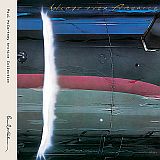
 New  |
 Wings Over America (2013 Remaster)  |
|
|
In an interview with the London Guardian newspaper that took place in Prague's T-Mobile Park, Sir Paul spoke to reporter John Harris about taking legal action against his friends John, George, and Ringo back in December, 1970:
"The fact that I had to sue the Beatles was something that was very, very difficult, 'cos I could see what that would do in terms of perception of me. People could quite easily say, 'You know what? I'd never do that, no matter if it meant losing everything. He's a hard-hearted bastard. And a mean bastard. And a money-grabbing bastard.' And doing well didn't help. We'd tried to get Apple going, and in the short term, it had failed spectacularly. And I started doing my own business, and it started to do quite well. That's what happened, and it resulted in that split: 'John's really cool, and Paul isn't.'"
More recently, there's been the threat of legal action from Yoko Ono following his decision to credit 19 songs on his live album to "Paul McCartney and John Lennon":
"It snowballed. People were phoning me up saying, 'You're doing yourself no favors with this, you know.' I was like, 'What are you talking about?' 'Well, you know, you want to knock John's name out. He's dead. It's terrible: you're walking on a dead man's grave.' I was like, 'Get the fuck out of here."What happened recently, was that my lyric to Blackbird was published in a poetry anthology as something written by John Lennon and Paul McCartney. And John had nothing to do with that lyric. I think he would actually be my great supporter in this, but unfortunately he's not here to tell us. So it's become a public thing, and I look like this total bastard trying to screw John over. Which I'm not. But now [comically raising his voice] I don't care! I don't want it! I wouldn't have it if you paid me!"
He does still care about the criticisms of his wife, Heather Mills:
"They didn't like me giving up Jane Asher. They didn't like that at all . It all started there. They would have quite liked that. They were set up for that, and then I married a New York divorcee with a child and, at the time, they didn't like that. This time around, I married a younger woman and they didn't like that. But again, it doesn't matter. What's important is that I thought it was a good idea, and I still do. But it reminds me of the stick Linda got. It's strangely similar. I have a nasty feeling that some of the people who do it were Paul fans, like some of the people I still get strange letters from.
"The British psyche can be very strange. Some of the people who do it most . . . well, I rang one or two of those journalists up, out of the blue. They'd just done sustained 'I hate Heather' stuff. It was a couple of lady columnists . . . I'd rather not give them the fame. I just said, 'I've been trying to ignore this, and somebody just gave me a bunch of press cuttings, and I've just looked through them all, and you said that . Well, that's actually wrong.' It was just nonsense: stories that Heather and I went to bed early at Stella's wedding. Well, we couldn't possibly have done - we were sleeping above the karaoke. I just rang them up and said, 'We actually didn't. You ask anyone who was there.' And they said, 'Well, someone who was there said you went to bed early.' I said, 'Well, they must have been pissed or something - COs we were up till dawn, in the disco, and I was on the karaoke. And I went down the list. I took a little time. Another thing was Heather's too old to wear above-the-knee boots. I said, 'Do you actually know why that is? She's an amputee, love. That's why she wears those boots.'
"I think it's a phenomenon in the British press, particularly at the moment, which isn't very helpful for our national identity. It encourages people to go [in a high-pitched scouse voice], 'Look at her! Look at him!' Our great organs do it, all the time: 'Ooh! Look at her! Look at him! Ooh - a footballer! Look at his hair!' It reminds me of these bloody people off the estate where I used to live - these dreadful gossips. It's puerile . It's the people you wished you'd left behind."
On Saturday, Sir Paul will perform at the Glastonbury Festival:
"I was asked to do Glastonbury, and for years, I've been sort of half-toying with the idea COs it's the great festival; the ongoing Woodstock. But you can't go from the Mean Fiddler to a big outdoor thing. I had to get my voice up. I had to get up there - [sings] 'waaaargh!' There's muscles involved. I do know that it's helpful if I've been at it, maybe a week or so before. Then I can slide into it a bit more. So I said, 'Let's do a few shows.' And that turned into a European tour. It does sound a bit silly, or that I'm very respectful to Glastonbury. I suppose I am."
Sir Paul told Mr. Harris that following this interview, his next appointment was with a Czech linguist he hired to teach him a few phrases so he could greet his audience in Prague in their native tongue:
"Most people really get ready before a show, but my last hour before a show's like an O-level exam. And it can be hard: Hungarian was very difficult. The translator kept saying - and I've forgotten the exact word, of course - 'Tishush'. And I was going, 'Tishush'. And she was going - 'No - Tishush .' I'd go 'Tish- ush ?' She said 'No - Tish -ush.' I thought I really had it; we took hours over this. It was a fuss over the tiniest little thing. But we saw her the next day after the concert and I said, 'How did it go down?' She said, 'My mother rang up. In her newspaper it said, 'He spoke Hungarian without a trace of an accent.'"
Does he still believe in the words he wrote in Freedom, the anthem he wrote following the terrorist attacks on the United States?
"After 9/11, I felt there had to be some sort of response. Some people were just saying, 'No, no - peace at all costs. Nothing must happen.' And my argument was, 'But peace is not what we're talking about. Two very big buildings have been taken out, in a place that's never had that kind of an attack before, with an unseen enemy.' I felt for the Americans, COs I was there, living with them. It wasn't like I was living in Muswell Hill thinking, 'We shouldn't do anything.' Something had to be done."He's not singing the song Freedom during this tour:
"No, it's not. It's more ambiguous now. It probably has become identified with the war effort. And I think that's a bad thing. It becomes a license to torture, and that's not what that song's about. It's really a We Shall Overcome thing. And at that time, playing it in America was helpful, healing, for some Americans. Now it's all got completely ugly - the whole Iraq thing, rushing in without the second resolution. It's all gone very wrong . . . It is crazy that they haven't found any weapons. I think the whole world is just puzzled by that. So it's ugly. It's now Vietnam."
Here Today, the song he wrote following the death of John Lennon, is still included on his set-list:
"At least once a tour, that song just gets me. I'm singing it, and I think I'm OK, and I suddenly realize it's very emotional, and John was a great mate and a very important man in my life, and I miss him, you know? It happened at the first show, in Gijon: I was doing fine, and I found myself doing a thing I've done in soundcheck, just repeating one of the lines: 'I love you, I love you, I love you.' I did that and I thought, 'That's nice - that works.' And then I came to finish the song, to do the last verse, and it was, 'Oh shit - I've just totally lost it.'"
What is the significance of the lines: "What about the night we cried/Because there wasn't any reason left to keep it all inside"?
"We were in Key West in 1964. We were due to fly into Jacksonville, in Florida, and do a concert there, but we'd been diverted because of a hurricane. We stayed there for a couple of days, not knowing what to do except, like, drink . I remember drinking way too much, and having one of those talking-to-the-toilet bowl evenings. It was during that night, when we'd all stayed up way too late, and we got so pissed that we ended up crying - about, you know, how wonderful we were, and how much we loved each other, even though we'd never said anything. It was a good one: you never say anything like that. Especially if you're a Northern Man."
(kindly submitted by PLUGGED correspondent Joan M. Hopkins)
| back |
©1994-2024 Harald Gernhardt. All Rights Reserved